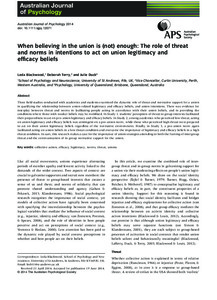When believing in the union is (not) enough: the role of threat and norms in intentions to act on union legitimacy and efficacy beliefs
"Three field studies conducted with academics and students examined the dynamic role of threat and normative support for a union in qualifying the relationship between union-related legitimacy and efficacy beliefs, and union intentions. There was evidence for interplay between threat and norms...
| Main Authors: | , , |
|---|---|
| Institution: | ETUI-European Trade Union Institute |
| Format: | TEXT |
| Language: | English |
| Published: |
Australian Journal of Psychology
2014
|
| Subjects: | |
| Online Access: | https://www.labourline.org/KENTIKA-19118222124919364049-When-believing-in-the-union-is.htm |
| Summary: | "Three field studies conducted with academics and students examined the dynamic role of threat and normative support for a union in qualifying the relationship between union-related legitimacy and efficacy beliefs, and union intentions. There was evidence for interplay between threat and norms in facilitating people acting in accordance with their union beliefs, and in providing the conditions where those with weaker beliefs may be mobilised. In Study 1, students’ perception of threat to group interests facilitated their preparedness to act on pro-union legitimacy and efficacy beliefs. In Study 2, among academics who perceived low threat, acting on union legitimacy and efficacy beliefs was contingent on a pro-union norm, while those who perceived high threat were prepared to act on their union legitimacy beliefs regardless of the normative environment. Finally, in Study 3, a pro-union norm again facilitated acting on union beliefs in a low threat condition and overcame the importance of legitimacy and efficacy beliefs in a high threat condition. In sum, this research makes a case for the importance of union strategies attending " |
|---|---|
| Physical Description: | 10 p. Digital |

